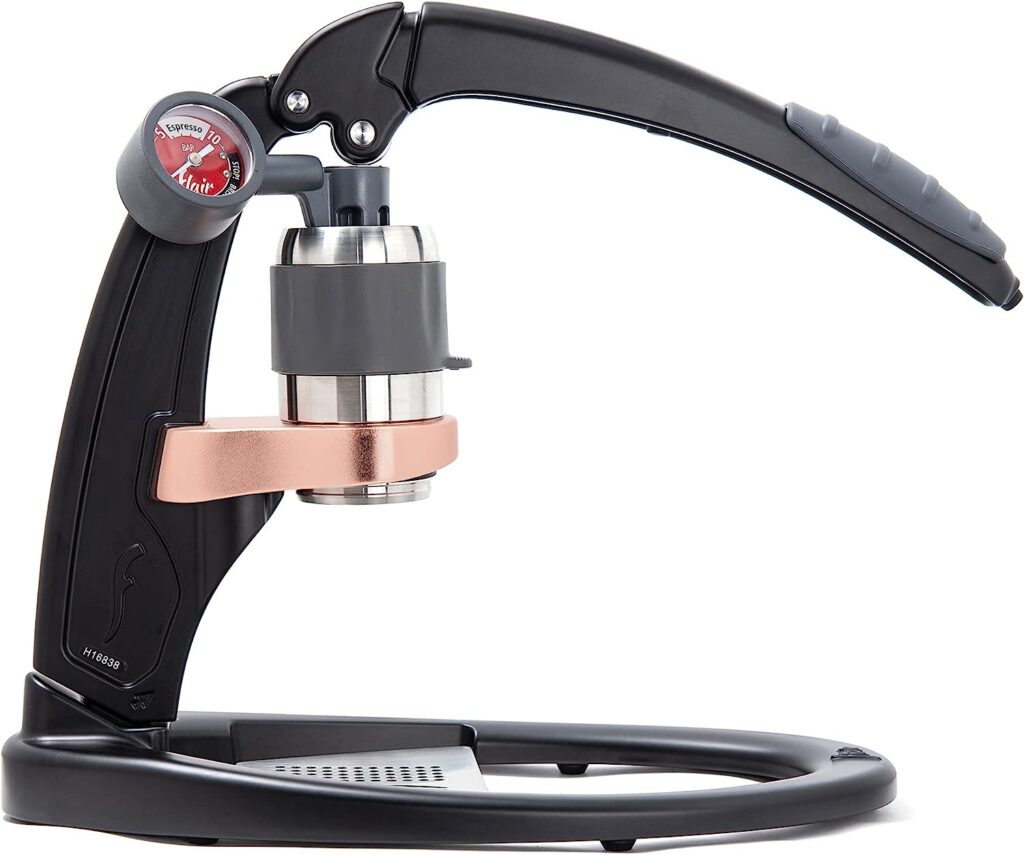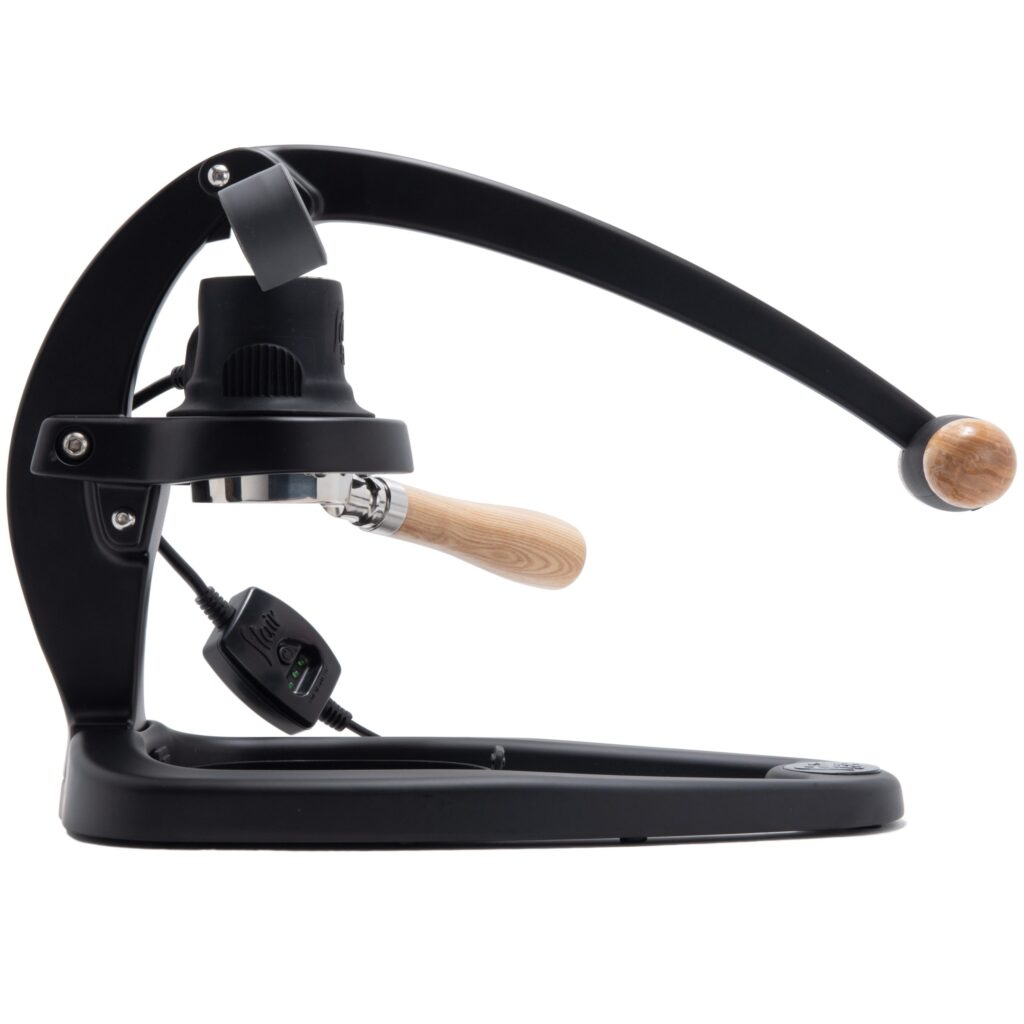Espresso
Brewing While Pregnant: Can You Safely Drink Espresso During Pregnancy

As an expecting mother, I understand the craving for a rich, aromatic cup of espresso. But can we indulge without putting our baby at risk? In this article, we’ll explore the potential risks of drinking espresso during pregnancy and shed light on the effects of caffeine on your baby.
Don’t worry, I’ve got you covered with safe limits and healthier alternatives. So grab a comfy seat, relax, and let’s dive into the world of brewing while pregnant.
Key Takeaways
- High levels of caffeine intake during pregnancy may increase the risk of miscarriage, preterm birth, low birth weight, and developmental delays.
- Caffeine easily crosses the placenta and affects the baby’s developing nervous system.
- Experts recommend limiting caffeine intake to 200 mg per day during pregnancy.
- It is advisable to replace espresso with healthier alternatives such as decaffeinated coffee, herbal teas, and nutrient-packed smoothies to minimize potential harm and ensure optimal health during pregnancy.
The Potential Risks of Drinking Espresso During Pregnancy
I’ve heard about the potential risks of drinking espresso during pregnancy, so I’m being cautious and sticking to decaf. It’s important to be aware of the potential side effects that consuming caffeine can have on both the mother and the developing baby.
Research findings suggest that high levels of caffeine intake during pregnancy may increase the risk of miscarriage, preterm birth, low birth weight, and developmental delays. Caffeine is a stimulant that can cross the placenta and affect the baby’s heart rate and metabolism.
However, it’s worth noting that moderate caffeine consumption, such as one or two cups of coffee per day, hasn’t been linked to these adverse effects. Nevertheless, it’s always best to consult with your healthcare provider to determine what’s safest for you and your baby during pregnancy.
Understanding the Effects of Caffeine on Your Baby
I should be mindful of the potential impact that caffeine can have on my baby’s development, even though I enjoy a cup of coffee in the morning. While it’s tempting to indulge in my caffeine cravings, it’s important to understand the effects of caffeine on the fetus and follow caffeine consumption guidelines during pregnancy. Here are three key points to consider:
-
Caffeine crosses the placenta: When I consume caffeine, it easily passes through the placenta and reaches my baby, affecting their developing nervous system. High levels of caffeine have been associated with increased risk of miscarriage, preterm birth, and low birth weight.
-
Recommended caffeine intake: Experts recommend limiting caffeine intake during pregnancy to 200 mg per day. This is roughly equivalent to one 12-ounce cup of coffee. It’s important to note that caffeine isn’t only found in coffee but also in tea, chocolate, and some medications.
-
Individual sensitivity: Every woman and baby may react differently to caffeine. Some babies may be more sensitive to its effects, leading to increased irritability and sleep disturbances. It’s essential to be aware of any changes in my baby’s behavior and adjust my caffeine consumption accordingly.
Considering the potential risks, it’s wise to be cautious about caffeine consumption during pregnancy.
Safe Limits: How Much Espresso Can You Drink
Based on current guidelines, it’s important to be mindful of the amount of espresso I consume to ensure that I stay within safe limits for my health.
While espresso can provide a quick pick-me-up and a burst of energy, it’s essential to consider the potential harm and health concerns associated with excessive consumption.
The primary concern is the high caffeine content in espresso, which can have adverse effects on the body. Consuming too much caffeine can lead to increased heart rate, elevated blood pressure, and even sleep disturbances.
Additionally, excessive caffeine intake during pregnancy has been linked to an increased risk of miscarriage and preterm birth. Therefore, it’s advisable to limit espresso consumption to a moderate amount, around 200-300 mg of caffeine per day, to minimize potential harm and ensure optimal health during pregnancy.
Alternatives to Espresso: Healthier Options for Pregnant Women
Finding suitable alternatives to espresso is crucial for pregnant women, as it allows them to enjoy a healthier beverage option without compromising their health or the well-being of their unborn child.
Here are three options that can satisfy your coffee cravings while keeping you and your baby safe:
-
Smoothie recipes: Replace your morning espresso shot with a nutrient-packed smoothie. Blend together fruits like bananas, berries, and mangoes with yogurt or almond milk for a delicious and energizing drink.
-
Herbal tea options: Herbal teas are a great choice for pregnant women seeking a caffeine-free alternative. Chamomile, ginger, and peppermint teas not only provide a soothing and refreshing taste but also offer various health benefits.
-
Decaffeinated coffee: If you still desire the taste of coffee, opt for decaffeinated versions. They contain only traces of caffeine, making them a safer choice during pregnancy.
By exploring these alternatives, you can enjoy a satisfying beverage while prioritizing the health of your baby.
However, if you still choose to consume coffee during pregnancy, there are some tips to keep in mind.
Tips for Enjoying Coffee During Pregnancy Without Compromising Your Baby’s Health
Drinking coffee during pregnancy can be enjoyable and safe for both me and my baby if I follow these helpful tips.
One key tip is to opt for decaffeinated options. Decaffeinated coffee still provides the comforting taste without the stimulating effects of caffeine. It’s important to note that decaffeinated coffee does contain a small amount of caffeine, but it’s significantly lower than regular coffee.
Another option to consider is herbal tea. Herbal teas, such as chamomile or ginger, can offer a warm and soothing beverage while avoiding caffeine altogether. However, it’s crucial to do thorough research on the specific herbs used in the tea, as some may not be safe for pregnancy.
It’s always a good idea to consult with a healthcare provider to ensure the safety of any beverage consumed during pregnancy.
Frequently Asked Questions
Can Drinking Espresso During Pregnancy Cause Miscarriage or Stillbirth?
Drinking espresso during pregnancy does not increase the risk of miscarriage or stillbirth. However, it is recommended to consume caffeine in moderation to avoid potential negative effects on the baby’s development.
Does Consuming Espresso During Pregnancy Increase the Risk of Preterm Labor?
I can’t say for sure, but consuming espresso during pregnancy may have an effect on maternal health and potentially impact breastfeeding. It’s best to consult with a healthcare professional for more information.
Can Drinking Espresso During Pregnancy Affect the Baby’s Growth and Development?
Drinking espresso during pregnancy can potentially have negative effects on the baby’s growth and development, as well as impact maternal health. It is important to consider the potential risks and consult with a healthcare professional.
Does Consuming Espresso During Pregnancy Increase the Risk of Birth Defects?
Yes, consuming espresso during pregnancy can increase the risk of birth defects. Prenatal caffeine consumption, including espresso, has been linked to negative effects on fetal development. It is best to avoid it.
Can Drinking Espresso During Pregnancy Lead to Long-Term Health Issues for the Baby?
Drinking espresso during pregnancy can potentially lead to long-term health issues for the baby. The effects of caffeine on fetal development and the potential risks of consuming espresso are well-documented.
Conclusion
In conclusion, it’s best to limit or avoid drinking espresso during pregnancy to ensure the health and well-being of your baby. The potential risks and effects of caffeine on your baby aren’t worth the indulgence.
Instead, opt for healthier alternatives and enjoy coffee in moderation. Prioritize your baby’s health by making informed choices and consulting with your healthcare provider.
Remember, a healthy pregnancy is the ultimate goal.
In the vast and diverse world of coffee, coffee alternatives, and tea, Olivia has found her calling. As an author and a dedicated coffee and tea aficionado, her work for Cappuccino Oracle reflects her profound love and understanding of the intricate complexities found within these beverages. Olivia’s passion for the subject serves as both a catalyst for her creativity and a connection point with her audience.
Olivia’s appreciation for coffee, coffee alternatives, and tea blossomed at an early age. She discovered that these beverages invigorated her senses and stimulated her creative spirit. From the nuanced flavors of single-origin roasts to the captivating narratives intertwined with coffee, coffee alternatives, and tea trade and culture, Olivia found an unlimited source of inspiration in her daily cup.
Her love for these beverages and her talent for storytelling eventually converged at Cappuccino Oracle. As an author, Olivia’s mission is to illuminate the intricate tapestry that makes up the world of coffee, coffee alternatives, and tea. Her articles span a diverse range of topics, encompassing everything from the unique flavors of different brews to the sociocultural history intertwined with their cultivation and consumption.
Espresso
Unleash Your Inner Barista: Brewing Espresso in the Great Outdoors

Are you tired of the boring routine of making your morning coffee inside? We have a new and exciting experience for you! Picture waking up to the tranquil beauty of nature, with stunning views all around, while savoring the delicious taste of gourmet coffee.

In this article, we’ll guide you on how to unleash your inner barista and brew espresso in the great outdoors. So, grab your equipment and join us on this exciting journey of becoming a barista in nature’s embrace.
Let’s get brewing!
Key Takeaways
- Brewing espresso outdoors allows you to experience peace and tranquility, connect with nature, and appreciate the brewing process.
- To enhance your outdoor espresso brewing experience, adjust the grind size using the Flair Royal hand grinder and pre-measure your coffee beans for consistency.
- It is important to be responsible in the outdoors by packing out used coffee grounds and trash, following local waste disposal regulations, and incorporating sustainable practices.
- The Flair PRO 2 Manual Espresso Maker offers easy maintenance, versatile brewing techniques, and complete control over the brewing process, resulting in exceptional espresso quality.
The Equipment You’ll Need
First, let’s talk about the equipment you’ll need to brew espresso in the great outdoors. When it comes to brewing espresso outside, choosing the right location is key. Find a serene spot, surrounded by nature’s beauty, where you can immerse yourself in the process.

Now, let’s not forget the importance of water quality. For a truly exceptional espresso, start with pristine water. Consider using filtered or bottled water to ensure the purest flavor.
As for the equipment, you’ll need a reliable water heating system, like the JetBoil Flash, to achieve the perfect temperature. Pair it with the Flair PRO 2 Manual Espresso Maker and the Flair Royal Hand Grinder for precision grinding and extraction.
With these tools in hand, you’ll be ready to unleash your inner barista and create a magical espresso experience in the great outdoors.
Benefits of Brewing Outside
Why should we choose to brew espresso outside and experience the benefits it offers? Brewing espresso in the great outdoors allows us to embrace nature while indulging in our passion. It is a truly immersive experience that brings us closer to the process and the flavors we love. Imagine waking up to the peaceful escape and tranquility of nature, surrounded by spectacular views and breathtaking landscapes.
As we brew our espresso, we feel connected to the earth, mindful of our actions, and grateful for the moment. The whole process becomes a mindful experience, where we savor each step and each sip.
Brewing outside creates memorable moments, allowing us to appreciate the beauty of nature while enjoying our favorite drink. It’s an intimate journey that combines the art of brewing with the wonders of the natural world.

Benefits of Brewing Outside Embracing Nature While Brewing Peaceful Escape and Tranquility Feel the serenity of nature while brewing your espresso. Spectacular Views and Breathtaking Landscapes Surround yourself with the beauty of the outdoors as you enjoy your drink. Embracing the Process and Connection with Nature Connect with the earth and the brewing process, feeling grounded and in harmony. Mindful Experience and Indulging in Flavors Engage your senses, appreciating every sip and the flavors that nature provides. Creating Memorable Moments Forge lasting memories as you combine your love for brewing with the wonders of nature.
Tips for Outdoor Espresso Brewing
Here are some essential tips to enhance our outdoor espresso brewing experience:
-
Grind Size Adjustment: The key to a perfect espresso lies in the grind size. With the Flair Royal hand grinder, we’ve the flexibility to adjust the grind size to our preference. Whether we prefer a fine grind for a bold and intense flavor or a coarser grind for a smoother taste, the choice is in our hands.
-
Pre-Measuring Coffee Beans: To ensure consistency and convenience in our outdoor brewing, it’s essential to pre-measure our coffee beans. By weighing and pre-dosing the coffee, we can eliminate guesswork and achieve the perfect coffee-to-water ratio every time. This step not only saves time but also guarantees a delicious cup of espresso.
-
Practicing Patience and Enjoying the Journey: Outdoor espresso brewing is more than just making a cup of coffee. It’s about embracing the process, being mindful of our surroundings, and immersing ourselves in the experience. Take a moment to appreciate the aroma, savor each sip, and create lasting memories in the great outdoors.

With these tips, we can elevate our outdoor espresso brewing to new heights of flavor and enjoyment.
Being Responsible in the Outdoors
Let’s talk about the importance of being responsible in the outdoors when brewing espresso.
As passionate coffee enthusiasts, it’s crucial that we prioritize sustainable practices and leave no trace behind. When enjoying our outdoor brewing adventures, we must remember to pack out used coffee grounds and trash, minimizing our impact on the environment.
It’s essential to be environmentally aware and follow local waste disposal regulations, preserving the beauty of nature for future visitors. By incorporating sustainable practices, such as using reusable coffee filters and opting for biodegradable packaging, we can make a positive difference.

Let’s embrace our love for espresso while also being mindful of the impact we’ve on the outdoors. Together, we can create memorable moments and protect the environment we cherish.
Introducing the Flair PRO 2 Manual Espresso Maker
We are excited to introduce the Flair PRO 2 Manual Espresso Maker, a compact and portable coffee maker that allows us to brew high-quality espresso in the great outdoors. With its sleek design and exceptional performance, the Flair PRO 2 is a must-have for coffee enthusiasts who crave a rich and flavorful espresso experience.

Here are three reasons why the Flair PRO 2 is the perfect companion for your outdoor brewing adventures:
-
Easy Maintenance: The Flair PRO 2 is built to last, with durable materials and a simple cleaning process. Its removable brew head and portafilter make maintenance a breeze, ensuring that your espresso maker stays in top shape.

-
Versatile Brewing Techniques: The Flair PRO 2 offers a wide range of brewing techniques, allowing you to experiment and tailor your espresso to your taste. From manual pre-infusion to pressure profiling, this espresso maker gives you complete control over every aspect of the brewing process.Exceptional Espresso Quality: The Flair PRO 2 is designed to deliver exceptional espresso shots, with its precise temperature control and pressure regulation. Whether you prefer a smooth and balanced flavor or a bold and intense shot, the Flair PRO 2 will consistently produce espresso of the highest quality.
With the Flair PRO 2 Manual Espresso Maker, you can elevate your outdoor brewing experience to new heights. From maintenance to brewing techniques, this espresso maker has everything you need to unleash your inner barista in the great outdoors.

Compact and Portable Design
With its compact and portable design, the Flair PRO 2 Manual Espresso Maker is the perfect espresso machine to take on your outdoor adventures.
This sleek and lightweight espresso maker is specifically designed to be easily transported, allowing you to enjoy your favorite espresso wherever your explorations may take you. Its compact size ensures that it won’t take up much space in your backpack or camping gear, making it an ideal companion for any outdoor enthusiast.
The Flair PRO 2 Manual Espresso Maker’s portability doesn’t compromise on performance either. It’s equipped with high-quality components and features that deliver exceptional espresso shots, ensuring that you can savor the rich flavors and aromas of specialty coffee even in the great outdoors.
Precision Grinding With the Flair Royal Hand Grinder
To achieve the perfect grind size for your outdoor espresso brewing, we recommend using the Flair Royal Hand Grinder and carefully adjusting the settings to ensure precision and consistency. The grind size adjustment feature of the Flair Royal Hand Grinder allows you to have full control over the extraction process, maximizing the flavors and aromas in your espresso.
Here’s why the Flair Royal Hand Grinder is the ideal choice for precision grinding:
-
Consistent Grind: The grinder’s high-quality burrs ensure a uniform grind size, resulting in a balanced extraction and a rich, flavorful espresso.
-
Easy Adjustment: With its simple and intuitive grind size adjustment mechanism, you can easily switch between fine, medium, and coarse settings to match your desired brewing method.
-
Maximizing Extraction: By dialing in the grind size, you can optimize the extraction process, ensuring that the water extracts the desired flavors from the coffee grounds, resulting in a well-balanced and delicious cup of espresso.
The Flair Royal Hand Grinder is the perfect companion for outdoor espresso brewing, providing the precision necessary to create a truly exceptional coffee experience.

Using Specialty Coffee for Optimal Flavor
For the best flavor experience, we recommend brewing your outdoor espresso with specialty coffee. Specialty coffee beans are carefully selected and roasted to bring out the unique flavors and characteristics of each variety. When choosing the right beans for your outdoor brewing, consider factors such as origin, roast level, and flavor profile. Experiment with different varieties to find your preferred taste.
To further enhance the flavor of your outdoor espresso, it’s important to use brewing techniques that bring out the best in your chosen beans. Adjusting the grind size, water temperature, and extraction time can all impact your espresso’s flavor profile.
Try using a coarser grind and a higher water temperature for a bright and fruity espresso. For a more balanced and chocolaty flavor, opt for a finer grind and a slightly lower water temperature.
Table: Brewing Techniques for Different Flavors
Flavor Profile Grind Size Water Temperature Bright and Fruity Coarser Higher Balanced and Chocolaty Finer Slightly Lower
Reliable Water Heating System for Quick Boiling
We rely on a portable and efficient water heating system, like the JetBoil Flash, to quickly boil water for our outdoor espresso brewing. When it comes to brewing espresso in the great outdoors, having a reliable water heating system is crucial. Here’s why the JetBoil Flash is our go-to choice:
-
Speed: With its powerful burner, the JetBoil Flash can bring water to a rolling boil in just a matter of minutes. This means we can enjoy our espresso without any unnecessary waiting around.
-
Convenience: The JetBoil Flash is compact and lightweight, making it easy to transport and set up wherever we go. Its simple and intuitive design allows for effortless operation, even in the most remote locations.
-
Versatility: While the JetBoil Flash excels at boiling water, it also offers alternative heating options, such as simmering and frying. This versatility allows us to expand our outdoor cooking options beyond espresso, making it a valuable addition to our camping gear.
With the JetBoil Flash by our side, we can confidently brew our espresso in the great outdoors, knowing that we’ve a reliable and efficient water heating system at our disposal.

Embrace Your Inner Barista in the Great Outdoors
As coffee enthusiasts, experiencing the great outdoors allows us to embrace our inner barista and connect with the art of brewing espresso. There’s something truly magical about being surrounded by nature, with the soothing sounds of birds chirping and the gentle breeze caressing our faces, as we prepare our favorite cup of coffee.
It’s a moment of tranquility and connection with the world around us. Mindful coffee brewing in the outdoors allows us to fully appreciate the process, from weighing and pre-dosing the coffee beans to carefully adjusting the grind size. We can take our time, savoring the aroma and flavors, while immersing ourselves in the beauty of our surroundings.
It’s a chance to create lasting memories and indulge in the simple pleasures of life. So, let’s grab our equipment, find a serene spot, and let nature inspire our inner barista.
Frequently Asked Questions
Can I Use a Different Manual Espresso Maker for Outdoor Brewing?
Yes, you can use a different manual espresso maker for outdoor brewing. There are many portable espresso makers for camping that offer the convenience and quality you need to enjoy a delicious espresso in the great outdoors.

How Do I Determine the Ideal Grind Size for My Outdoor Espresso Brewing?
To determine the ideal grind size for outdoor espresso brewing, we carefully adjust the grind while considering the desired brew time. This ensures a rich and flavorful cup of espresso that perfectly captures the essence of the outdoors.
Are There Any Specific Types of Specialty Coffee That Work Best for Outdoor Espresso Brewing?
The best coffee beans for outdoor brewing techniques should be specialty beans from reputable local roasters. They offer optimal flavors that enhance the outdoor espresso experience, creating a truly indulgent and memorable moment.
Can I Use a Different Water Heating System Instead of the Jetboil Flash?
Yes, there are alternative water heating systems you can use instead of the Jetboil Flash. We have found success with other portable options like the MSR PocketRocket or the Primus Lite+.
What Are Some Additional Ways to Minimize My Impact on the Environment While Brewing Espresso Outdoors?
To minimize our impact on the environment while brewing espresso outdoors, we can prioritize eco-friendly coffee bean sourcing and opt for sustainable packaging options. It’s important to make conscious choices that align with our values and protect the planet we love.
Conclusion
As we bid farewell to the comforting routine of brewing espresso indoors, we embark on a thrilling journey of becoming outdoor baristas.
With the Flair PRO 2 Manual Espresso Maker as our trusty companion, we unlock a world of rich flavors and breathtaking views.

Let nature’s serenity and specialty coffee’s aroma awaken your senses and ignite your passion for the art of outdoor brewing.
So, grab your gear, embrace your inner barista, and let’s make memories in the great outdoors!
In the vast and diverse world of coffee, coffee alternatives, and tea, Olivia has found her calling. As an author and a dedicated coffee and tea aficionado, her work for Cappuccino Oracle reflects her profound love and understanding of the intricate complexities found within these beverages. Olivia’s passion for the subject serves as both a catalyst for her creativity and a connection point with her audience.
Olivia’s appreciation for coffee, coffee alternatives, and tea blossomed at an early age. She discovered that these beverages invigorated her senses and stimulated her creative spirit. From the nuanced flavors of single-origin roasts to the captivating narratives intertwined with coffee, coffee alternatives, and tea trade and culture, Olivia found an unlimited source of inspiration in her daily cup.
Her love for these beverages and her talent for storytelling eventually converged at Cappuccino Oracle. As an author, Olivia’s mission is to illuminate the intricate tapestry that makes up the world of coffee, coffee alternatives, and tea. Her articles span a diverse range of topics, encompassing everything from the unique flavors of different brews to the sociocultural history intertwined with their cultivation and consumption.
Espresso
Mochaccino – What Is It and How Do You Make It at Home

Have you ever pondered what makes a mochaccino so irresistibly delicious? Let me share with you that it’s the impeccable combination of bold espresso, creamy chocolate, and frothy milk.
And the best part? You can easily make this indulgent treat right in the comfort of your own home. In this article, I’ll guide you through the history, ingredients, and step-by-step process of creating the perfect homemade mochaccino.
Get ready to impress your taste buds and become your very own barista!
Key Takeaways
- The mochaccino originated in Italy in the 17th century as a combination of espresso and hot chocolate.
- The flavors of the mochaccino have evolved over time, with variations including caramel, vanilla, and peppermint.
- The cultural significance of the mochaccino varies in different countries.
- To make a homemade mochaccino, you will need strong brewed coffee, cocoa powder, milk, sugar, and whipped cream for topping.
History of the Mochaccino
I’ve read about the history of the mochaccino, and it’s fascinating how this delightful drink has evolved over the years.
The mochaccino, also known as a mocha, originated in Italy in the 17th century. It started as a combination of espresso and hot chocolate, creating a rich and indulgent beverage.
As time went on, the flavors of the mochaccino began to evolve. Today, you can find variations with added flavors like caramel, vanilla, or even peppermint.
In different countries, the cultural significance of the mochaccino varies. In Italy, it’s a staple in their coffee culture, while in the United States, it has become a popular choice among coffee enthusiasts.
The mochaccino has truly become a global favorite, adapting to different tastes and preferences around the world.
Ingredients for a Homemade Mochaccino
I can make a delicious homemade mochaccino with just a few simple ingredients and a little bit of time.
The key to a perfect mochaccino is combining the rich flavors of coffee and chocolate. For this, you’ll need strong brewed coffee, cocoa powder, milk, sugar, and whipped cream for topping.
To start, mix cocoa powder with a small amount of hot water to create a smooth paste. Then, heat milk on the stovetop until hot but not boiling. Add the cocoa paste and sugar to the milk, stirring until dissolved.
Next, pour the coffee into a mug and slowly pour the milk mixture over it. Finally, finish with a dollop of whipped cream. It’s a delightful treat that combines the best of both worlds – coffee and chocolate.
And if you’re looking for coffee alternatives or health benefits, a homemade mochaccino is a perfect choice.
Step-by-Step Guide to Making a Mochaccino at Home
With just a few simple steps and some common ingredients, you can easily make a delicious mochaccino at home. Here’s how:
-
Start by brewing a strong cup of coffee using your preferred method. You can use a traditional drip coffee maker, a French press, or even try alternative brewing methods like pour-over or cold brew for a unique flavor profile.
-
While your coffee is brewing, warm up some milk on the stove or in the microwave. You can use any type of milk you prefer, such as dairy milk, almond milk, or oat milk.
-
Once your coffee is ready, pour it into a mug and add a tablespoon or two of cocoa powder. Mix until the cocoa powder is fully dissolved.
-
Finally, pour the warm milk into the mug and stir well. You can also top it off with some whipped cream or chocolate shavings for an extra indulgent touch.
Making your own mochaccino at home not only allows you to control the quality of ingredients but also offers health benefits. The coffee provides a boost of energy and can improve cognitive function, while cocoa powder is rich in antioxidants and can boost mood. Additionally, using alternative milk options can cater to dietary preferences or restrictions.
Variations and Additions to the Classic Mochaccino Recipe
There are many ways to elevate the classic mochaccino recipe, such as adding a dash of cinnamon or a drizzle of caramel syrup for a hint of sweetness. But have you ever considered exploring different types of mochaccinos for their unique flavors and health benefits? Let’s take a look at some interesting variations:
| Type | Flavor Profile | Health Benefits |
|---|---|---|
| Matcha Mochaccino | Earthy and Creamy | High in antioxidants |
| Coconut Mochaccino | Rich and Nutty | Boosts metabolism |
| Protein Mochaccino | Creamy and Filling | Provides muscle recovery |
These different types of mochaccinos not only offer a diverse range of flavors but also come with their own set of health benefits. Now that we’ve explored the possibilities, let’s move on to some tips and tricks for perfecting your homemade mochaccino.
Tips and Tricks for Perfecting Your Homemade Mochaccino
To achieve the perfect homemade mochaccino, don’t forget to froth the milk until it reaches a creamy consistency. Frothing the milk adds that luxurious touch to your drink, creating a velvety texture that perfectly complements the rich flavors of chocolate and espresso.
Here are some tips and tricks to help you perfect your homemade mochaccino:
-
Use high-quality coffee beans: The best coffee beans for a mochaccino are those with a bold flavor profile. Look for beans with a rich, chocolaty undertone to enhance the chocolate flavor in your drink.
-
Experiment with homemade coffee alternatives: If you’re looking to switch things up, try using alternative coffee options like cold brew or espresso powder. These can add a unique twist to your mochaccino.
-
Adjust the sweetness: Mochaccinos are typically sweet, but you can adjust the sweetness to your preference. Add more or less chocolate syrup or sweetener to achieve the perfect balance for your taste buds.
-
Get creative with toppings: Don’t forget the finishing touches! Whipped cream, chocolate shavings, or a sprinkle of cinnamon can elevate the presentation and add an extra layer of flavor to your homemade mochaccino.
Frequently Asked Questions
Can I Use Regular Coffee Instead of Espresso in a Homemade Mochaccino?
Yes, you can use regular coffee instead of espresso in a homemade mochaccino. However, using espresso will give your drink a stronger and richer flavor, which is one of the benefits of using it.
How Many Calories Are in a Homemade Mochaccino?
I made a homemade mochaccino with whole milk and dark chocolate syrup. It has around 200 calories, but the nutritional value may vary depending on the ingredients used.
Can I Use Almond Milk Instead of Cow’s Milk in a Homemade Mochaccino?
Yes, almond milk can be used as a dairy-free alternative in a homemade mochaccino. It provides a creamy texture and a nutty flavor that complements the coffee and chocolate.
What Type of Cocoa Powder Is Best for Making a Mochaccino at Home?
When making a mochaccino at home, it’s important to choose the best cocoa powder. Look for high-quality brands, like Ghirardelli or Valrhona, for a rich and delicious flavor. Don’t forget to consider alternative milk options, like almond milk, for a dairy-free version.
Can I Make a Mochaccino Without a Milk Frother?
Sure, you can make a mochaccino without a milk frother. There are alternative methods like using a whisk or a handheld frother. These frothing techniques will give you a similar creamy texture.
Conclusion
In conclusion, the mochaccino is a beloved coffee beverage that combines the rich flavors of chocolate and espresso.
By following the step-by-step guide and using high-quality ingredients, you can easily make a delicious mochaccino at home.
Don’t be afraid to get creative with variations and additions to suit your taste.
With a little practice and a few tips and tricks, you’ll be able to perfect your homemade mochaccino and enjoy this indulgent treat whenever you like.
Justin is a seasoned author, coffee and tea enthusiast, and an essential member of the Cappuccino Oracle team. With a keen appreciation for the complexities of coffee, coffee alternatives, and tea, Justin has dedicated his professional career to exploring these realms and sharing his insights with readers worldwide.
Justin’s immersion in the world of coffee, coffee alternatives, and tea began at a young age, kindling a passion that extended beyond mere consumption. This love for these beverages led him to combine his talent for writing with his devotion to coffee and tea, bringing him to Cappuccino Oracle as a dedicated author.
Espresso
Iced Macchiato – What Is It and How to Make It at Home

I enjoy a delicious iced macchiato on a warm summer day. Were you aware that it’s surprisingly simple to prepare at home? With just a few basic ingredients and some knowledge, you can savor this invigorating coffee drink whenever you desire.
In this article, I’ll share with you the secrets to making the perfect iced macchiato, from brewing the espresso to frothing the milk.
So grab your favorite mug and let’s get started!
Key Takeaways
- Iced macchiato originated in Italy as a variation of traditional macchiato.
- The base ingredients of an iced macchiato are espresso, milk, sweetener (optional), and ice.
- Brewing espresso for an iced macchiato requires precision and consideration of factors like grind size, brewing time, and water temperature.
- Frothing milk for an iced macchiato involves using techniques like using cold milk, alternative milk options, and a steam wand or frother.
The Origins of Iced Macchiato
I’ve always been curious about the origins of the iced macchiato. This popular coffee beverage has its roots in Italy, where the term ‘macchiato’ means ‘stained’ or ‘marked.’ Traditionally, a macchiato is made by adding a small amount of espresso to a cup and then ‘staining’ it with a dollop of frothed milk.
The iced macchiato, however, is a variation that emerged in recent years. It’s made by pouring espresso over a glass filled with ice and then adding a small amount of milk or milk foam. The result is a refreshing and flavorful drink, perfect for hot summer days.
Nowadays, there are many variations of the iced macchiato, with different flavors and toppings added to enhance the taste. From caramel to vanilla to chocolate, there’s an iced macchiato for every coffee lover’s preference.
Understanding the Ingredients
Understanding the ingredients is essential for making a delicious iced macchiato at home. When it comes to flavor profiles, the combination of sweet and bitter is what makes an iced macchiato so enticing. Here are some key ingredients to consider:
- Espresso: The base of an iced macchiato, providing a strong and rich flavor.
- Milk: Adds creaminess and balances out the espresso’s intensity.
- Sweetener: Optional, but commonly used to enhance the overall taste.
- Ice: Keeps the drink refreshing and cold.
- Optional flavorings: Vanilla, caramel, or chocolate syrups can be added for extra flavor.
Understanding different brewing methods is also important. Whether you prefer using an espresso machine, a French press, or a moka pot, each method can influence the taste and strength of your iced macchiato. Experimenting with different brewing techniques and ratios will help you find the perfect balance of flavors for your homemade iced macchiato.
The Art of Brewing Espresso
Brewing espresso is an intricate process that requires precision and skill. To achieve the perfect cup, espresso brewing techniques and the importance of water temperature can’t be overlooked.
When it comes to espresso brewing techniques, there are various methods to choose from. Some popular ones include the classic manual espresso machine, the convenient pod-based system, and the modern espresso machine with advanced features. Each technique requires careful consideration of factors such as grind size, brewing time, and pressure.
However, one common factor that’s crucial in all techniques is water temperature. The ideal water temperature for brewing espresso is between 195°F and 205°F. This range ensures proper extraction of flavors and oils from the coffee grounds, resulting in a rich and balanced espresso shot.
Transitioning to the next section, after perfecting the espresso shot, the focus shifts to perfecting the milk froth.
Perfecting the Milk Froth
I absolutely love experimenting with different techniques to perfect the milk froth for my iced macchiatos. It’s an art form in itself, and getting that perfect creamy texture on top of my espresso is essential for a delicious drink.
When it comes to creating the perfect milk froth, there are a few things to consider. Here are some tips to help you explore alternative milk options and troubleshoot common frothing issues:
- Use cold milk: Starting with cold milk will help create a better froth.
- Choose the right milk: Experiment with different types of milk, such as almond, oat, or soy, to find the one that froths best for you.
- Froth the milk properly: Use a steam wand or a frother to create a creamy and velvety texture.
- Watch the temperature: Overheating the milk can result in a burnt taste, so make sure to stop frothing when the milk reaches around 150°F.
- Clean and maintain your equipment: Regularly clean your steam wand or frother to ensure optimal frothing performance.
By following these tips, you’ll be on your way to creating the perfect milk froth for your iced macchiatos, and exploring alternative milk options along the way.
Happy frothing!
Step-by-Step Guide to Making Iced Macchiato at Home
To make an iced macchiato at home, I followed a simple step-by-step guide using a shot of espresso, a splash of milk, and a drizzle of caramel syrup.
First, I brewed a strong shot of espresso and let it cool.
Then, I filled a glass with ice and poured the espresso over it.
Next, I added a splash of milk, using almond milk as an alternative option for a creamy and nutty flavor.
To enhance the taste, I drizzled caramel syrup over the top, giving it a sweet and indulgent twist.
The beauty of making an iced macchiato at home is that you can get creative with variations.
You can experiment with different types of milk, such as oat milk or coconut milk, to suit your preferences.
Additionally, you can add flavored syrups like vanilla or hazelnut to customize your macchiato even further.
Enjoy this refreshing and satisfying beverage right in the comfort of your own home.
Frequently Asked Questions
What Is the Nutritional Content of an Iced Macchiato?
The nutritional content of an iced macchiato depends on the ingredients used. It can provide benefits such as a boost of energy from caffeine, but may also have health concerns like added sugars or high calorie content.
Can I Use Any Type of Milk to Make an Iced Macchiato?
I can use any type of milk to make an iced macchiato. Options like almond, oat, or soy milk can be used as alternatives. Additionally, different types of sweeteners can enhance the flavor.
How Long Does It Take to Brew Espresso for an Iced Macchiato?
To brew espresso for an iced macchiato, I recommend using an espresso machine and grinding fresh coffee beans. It typically takes about 25-30 seconds to extract the espresso. Froth the milk using a frother or steam wand until it reaches a creamy consistency.
Can I Use a Regular Blender to Froth the Milk for an Iced Macchiato?
Yes, you can use a regular blender to froth the milk for an iced macchiato. It’s a convenient and cost-effective alternative. You can also explore different milk options like almond, oat, or soy for a unique twist.
Can I Customize the Flavor of an Iced Macchiato by Adding Syrups or Toppings?
Yes, you can customize the flavor of an iced macchiato by adding syrups or toppings. It’s a great way to experiment with different milk alternatives and create your own unique and delicious drink.
Conclusion
In conclusion, making an iced macchiato at home is a simple process that can be mastered with practice. By understanding the origins of this popular drink, familiarizing oneself with the ingredients, and perfecting the art of brewing espresso and frothing milk, anyone can enjoy a delicious iced macchiato from the comfort of their own home.
Fun fact: Did you know that iced macchiatos are the most popular coffee choice among millennials, accounting for 40% of their coffee orders?
Noah, the Editor-in-Chief at Cappuccino Oracle, plays a pivotal role in shaping the voice and vision of our renowned platform. With an unwavering passion for coffee, coffee alternatives, and tea, Noah leads Cappuccino Oracle towards new horizons in the realm of coffee journalism.
Beyond his professional responsibilities, Noah serves as a mentor and guiding force for his team. His dedication to journalistic excellence and genuine love for coffee, coffee alternatives, and tea continue to inspire and motivate the Cappuccino Oracle family. In the ever-evolving world of these beverages, Noah’s leadership ensures that our platform remains at the forefront, delivering enlightening and enjoyable content to our readers worldwide.
-

 Americano4 weeks ago
Americano4 weeks agoHow to Make Americano With Moka Pot
-

 Americano2 weeks ago
Americano2 weeks agoHow to Make Korean Iced Americano
-

 Americano4 weeks ago
Americano4 weeks agoHow to Make Iced Americano With Instant Coffee
-

 Americano4 weeks ago
Americano4 weeks agoHow to Make Americano With Bialetti
-

 Americano4 weeks ago
Americano4 weeks agoHow to Make Dutch Bros Americano
-

 Americano6 days ago
Americano6 days agoHow to Make an Iced Americano With Nespresso
-

 Americano2 weeks ago
Americano2 weeks agoHow Many Shots of Espresso for 16 Oz Americano
-

 Turmeric Tea1 week ago
Turmeric Tea1 week agoTurmeric Saffron Tea


















